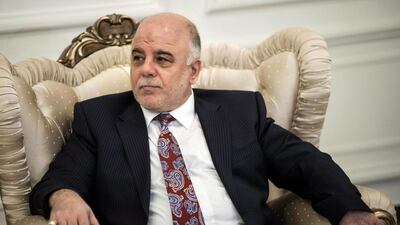BAGHDAD // As fighting in Iraq raged last summer, Iranian Maj Gen Qassem Suleimani came across unexpected opposition to his plans to defeat ISIL.
Gen Suleimani, the commander of Iran’s Al Quds brigade, has been a key figure in the fight against the Sunni extremist group in Iraq, which has been led by Iran-backed Shiite militias – not Iraq’s army.
But in August, Iraqi prime minister Haider Al Abadi told the general that a planned assault on the predominantly Sunni city of Ramadi should be left to his army, according to a government official and two diplomats.
Mr Al Abadi, a 64-year-old Shiite, wanted the militias to stay away to avoid inflaming ethnic tensions, the sources said.
Three Iraqi politicians denied it ever happened.
But the government official and the diplomats said the incident was one of a series of moves by the prime minister to assert his authority and to distance himself from Tehran and the militias that came to Baghdad’s rescue in 2014 and early 2015.
Mr Al Abadi has begun to push for reconciliation between Iraq’s Shiites and Sunnis, and for better relations with Sunni Arab neighbours like Saudi Arabia, they said.
If he can bridge the gap between rival sectarian communities as he has promised, he will have gone a long way towards reuniting a country which has been deeply riven since the fall of Saddam Hussein in 2003.
Mr Al Abadi also objected to Gen Suleimani’s plane landing at Baghdad airport without prior permission, the sources said. The deterioration in their relationship, the sources said, began in August when Gen Suleimani attended a top Iraqi security meeting headed by Mr Al Abadi and behaved in what one source said was “a bossy manner as if Iraq was an Iranian protectorate”.
This led Mr Al Abadi to ask Gen Suleimani why he was at the meeting. The Iranian general subsequently left.
“Abadi questioned his presence. It was a matter of Iraqi sovereignty and nationalism,” a western diplomat said.
The Iraqi government official said Mr Al Abadi and Gen Suleimani had not fought but were “keeping an operational, businesslike relationship. We can’t say it’s warm”.
Whatever the case, Gen Suleimani has receded from public view in Iraq in the past six months. The omnipresent posters and television images of him on the battlefield have all but disappeared.
There are likely to be limits to that change. Iran’s allies within Mr Al Abadi’s Shiite camp are pushing back against his more muscular stance, while the collapse in oil prices has cut the government budget, said Hisham Al Hashemi, an Iraqi government adviser and an expert on ISIL.
For now though, Mr Al Abadi seems to be trying to deliver on his initial address to parliament in 2014 in which he painted a vision of a decentralised and united Iraq.
The army’s victory against ISIL in Ramadi was a key moment.
An elite corps of the Iraqi army dislodged the extremists from the city in the final days of 2015. Support came from US warplanes while Sunni tribesmen held the ground behind the army lines.
The army is now preparing to take on ISIL in Fallujah, a bastion of Sunni radicals to the west of Baghdad, and plans to start a push north towards Mosul.
A decade ago, Mr Al Abadi backed a US-initiated de-Baathification campaign that effectively removed Sunnis from state, army and police positions.
But when he became prime minister he promised to unite the country. At first, he struggled to assert himself and US officials perceived him as a weak leader needing the backing of the militias.
But on February 9, Mr Al Abadi renewed a bid to dismantle the country’s patronage system and root out corruption. He also wanted a government reshuffle with technocrats as ministers, surprising several groups of his ruling coalition.
“He made the announcement straight to the media, without consulting the party leaders,” the government official said.
Mr Al Abadi has also improved relations with Iran’s regional rival Saudi Arabia. In December, Riyadh reopened its embassy in Baghdad, 25 years after it shut following Iraq’s invasion of Kuwait. Saudi ambassador Thamer Al Shabhan said the move would enable greater cooperation against extremism.
The closer ties survived their first test in January, when Saudi Arabia executed the Shiite cleric Nimr Al Nimr on terrorism charges. The Iraqi government resisted pressure from Shiite groups to break off ties and instead offered to mediate between Riyadh and Tehran.
“Abadi has kept himself at arm’s length” from Iran, said a European diplomat. “He has only been to Tehran two or three times in 18 months, not like his predecessor who would go all the time.”
However, convincing Sunni Iraqis that he is sincere will not be easy.
* Reuters

